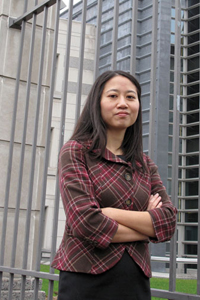
Bio:
Jamie Liew is a graduate of the joint LLB/MA Program of the University of Ottawa, Faculty of Common Law and the Norman Paterson School of International Affairs at Carleton University. She obtained her LL.M. at Columbia Law School. After clerking with Justice Douglas Campbell at the Federal Court, she founded Galldin Liew LLP, a feminist legal practice in Ottawa. She practiced mainly immigration and refugee law, but also represented clients in areas such as criminal law, family law, landlord tenant law, and civil litigation. Known for representing an American lesbian member of the U.S. military in an asylum claim, Jamie was successful in judicially reviewing a negative refugee decision at the Federal Court (Smith v. Canada (Minister of Citizenship and Immigration), 2009 FC 1194). Jamie also worked on the Sesay Defence Team at the Special Court in Sierra Leone and with the Cornwall Public Inquiry. She currently teaches torts, public law and administrative law at the Faculty of Common Law, University of Ottawa. Jamie's recent scholarly publications address democracy in state protection determinations in refugee hearings and how it impacts Mexican women claiming on the basis of domestic violence; the harsh application of strict liability notions in Canada's immigration family class rules; and lessons from detaining foreign nationals in the United States and how it can inform Canada's proposed policy to detain people arriving by boat: ?Creating Higher Burdens: The Presumption of State Protection in Democratic Countries? (2009) 26(2) Refuge 207; ?Beyond Country of Origin: Smith v. Canada and Refugees from Unexpected Places? (2011) 23(1) Canadian Journal of Women and the Law 686; 'Managing the Fear of the Tsunami: Canada's Proposed Policy to Detain Boat People and Lessons Learned from the United States' Detention Policies' (2011) 13 Rutgers Race & Law Review (forthcoming); and 'Ultrahazardous Activity: Balancing the Protection of our Borders with the Best Interests of the Child' Gender and Sexuality Law Online (February 14, 2011) at blogs.law.columbia.edu/.../Jamie-Liew-Violence-and-the-Form.pdf.
Title of paper:
'Gender-based Persecution: A Generalized Risk or Basis for Refugee Protection?'
Abstract:
The 1951 Refugee Convention was initially seen as a way to provide protection to European refugees after World War II. The adoption of the 1967 Protocol removed the geographical and time limitations and thus expanded the scope of the Convention beyond WWII. Undoubtedly, however, the drafters would not have foreseen that the Convention would be used to protect refugees fleeing gender-based persecution. Using Canada as a case study, this discussion will examine how the Convention has fared in protecting refugee women in recent decades. Do gender-based refugee decisions adhere to the Refugee Convention? What about other international legal instruments crafted after the Refugee Convention designed to protect women? In reviewing the trends in Canada, what normative statements are being made by refugee determinations regarding whether women are sufficiently protected? What is enough state protection from domestic violence or violence based on sexual orientation? Can non-state actors be considered when discussing a woman's options for protection, or is domestic violence so rampant that it could be considered a "generalized risk" and therefore a reason to deny refugee protection? In light of the expanded application of the Refugee Convention, there is a need to examine the normative statements domestic decisions make about adequate protection for women, and how these statements could possibly shape expectations to protect women not only internationally but also domestically.